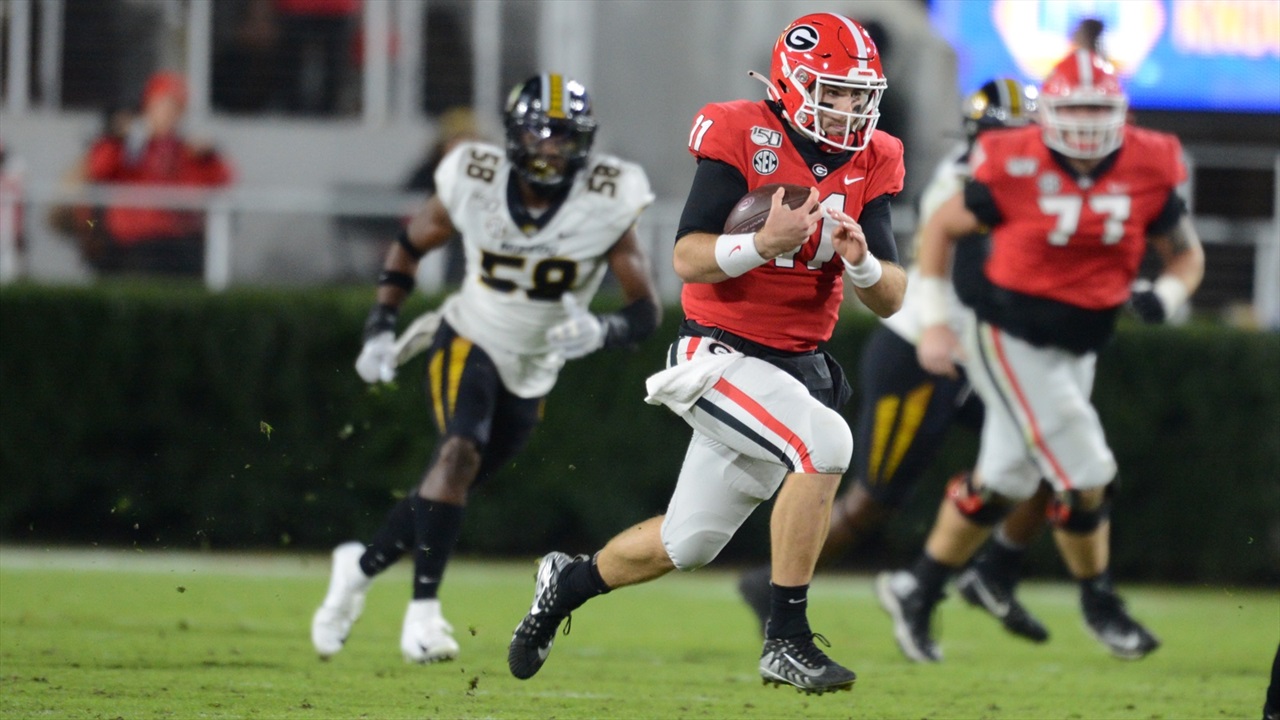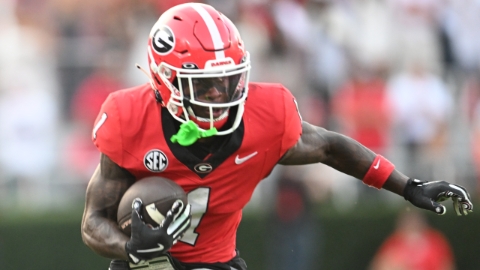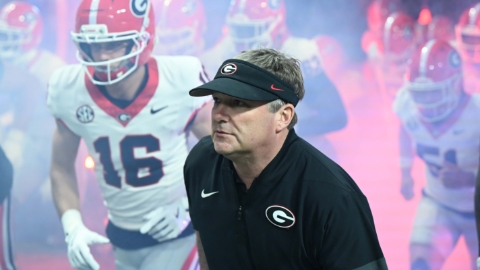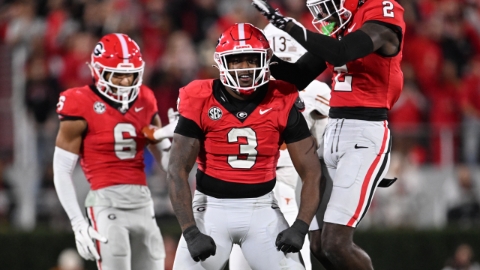Ranked Wins "Made the Difference" for UGA over Alabama

Good evening. We have concluded the second week of the 2019 selection process. The committee has ranked LSU as No. 1, Ohio State No. 2, Clemson No. 3, and Georgia No. 4. Here's why:
LSU has four wins against top-20 teams, the most of any team in the nation. LSU's win on the road against Alabama was impressive. Its offense is explosive. LSU is ranked No. 1.
Ohio State is ranked No. 2. It continues to play at a consistently high level on both sides of the ball. They're an excellent team.
Clemson is also dominant on both sides of the ball. Although its schedule is not as strong as some others, Clemson is an excellent undefeated team. They have gained more than 500 yards of offense in each of their last five games. The committee is impressed with what it sees.
Georgia, with wins against both Florida and Notre Dame, put them at No. 4 in the rankings this week. The committee spent a lot of time comparing Georgia and Alabama. In the end, Georgia's two wins over ranked teams made the difference in the No. 4 spot. Alabama clearly is a strong team, but the committee gave the edge to Georgia.
Finally, let me say a word about undefeated Minnesota, which we ranked No. 8. Its win against then-fourth-ranked Penn State was impressive. They have a powerful offense and have added a win against a highly ranked team.
I want to express my thanks to the members of the committee who travel to Dallas each week and work so hard to get things right. Please note that we were down one member this week. Chris Howard had previously informed us that he had a conflict he could not avoid. Happy to take any questions.
Rob, you mentioned the four top-20 wins for LSU. I'm curious, what was it that the committee saw from Texas that pushed them into that realm of the rankings and also what is lacking from a team like Indiana that hasn't pushed it that far yet?
ROB MULLENS: Well, when you look at Texas, obviously they have close losses to LSU and to Oklahoma, so two of their losses are against ranked teams, and understand they do have that third loss against TCU, but they also beat a ranked Kansas State team. That's what the committee saw in looking at Texas.
Indiana, we didn't go into great discussion about them because they weren't on the board.
Following up, you mentioned last week Chase Young. I think he was maybe the only defensive player that you mentioned by name in your discussions last week. Obviously he's not playing for Ohio State right now. Does the committee look at individual players in any way like that, as either a negative if they're not going to be there potentially in the long-term or a positive if a team does what Ohio State did last week without its best player?
ROB MULLENS: Part of the committee's role is to make sure we're aware of who plays in games. We don't project, we just look at who plays in the games, so we are aware of what players are in the games.
How much weight do you guys put in when you look at the final score? Sometimes a team could lose by six and really have been dominated, and sometimes they could lose by 20 and it doesn't necessarily mean they were blown out. How much does the final score weigh into the factor of the way you guys analyze these teams, and does it have any importance to you whatsoever what the numbers are on the scoreboard at the end of the game?
ROB MULLENS: No, we're not looking at the final score. We're watching the games. We understand how the games unfold by watching them. Again, we're fortunate to have the resources provided to us by the CFP that allows us to capture these games and watch them in different formats.
You mentioned spending -- the committee spending a lot of time with Georgia and Alabama and those wins. How much were their respective losses to South Carolina and LSU part of that discussion, and how does that balance out with those wins?
ROB MULLENS: It's certainly a part of the discussion, no doubt. We're aware of the South Carolina loss for Georgia and that Alabama's loss was against a team that was ranked No. 1, so that's clearly on the board when we're comparing them. But we're also looking at Georgia's wins against top-20 teams Florida and Notre Dame.
When it comes to the Minnesota discussion moving all the way up to No. 8 after a big win over Penn State, how did that conversation go in comparison to one-loss teams like Oregon and Utah that you have ahead of a team that I think by all accounts obviously had a signature win this week and had been playing really, really well in the weeks leading up to it?
ROB MULLENS: Yeah, as a reminder, when Oregon is in the discussion, I'm recused from the room, so a lot of this gets reported back to me where those teams are ranked and I'm welcomed back to the room.
But again, the conversation is when you're looking at Minnesota, their schedule was a concern, particularly their non-conference schedule, and just as it laid out up through week 10, they had only played one team in their league that had a winning record, but the added win against Penn State obviously impressed the committee.
Several times now you've referenced the discussion between Georgia and Alabama, and I know you have to recuse yourself when Oregon is discussed, but is it fair to characterize that there is a separation and demarcation between five and six, between Oregon and Alabama right now?
ROB MULLENS: Again, I'm not in the room, but when I came back and just for those of you that know how the system works, you rank one through three, then you work from a pool of teams and rank four through six. There's a lot of discussion about all the teams in that pool, and the separator for Georgia in that pool was their two wins against top-20 teams.
I asked you this last week: How close was it between LSU and Ohio State? And you mentioned the Chase Young thing earlier. Does that have any role at all in Ohio State slipping to No. 2, him not playing and his uncertainty?
ROB MULLENS: I'll answer those in reverse order. Again, we were aware that he wasn't available, but when we watched Ohio State we still saw an impressive performance, a dominant win. Those two teams are both great teams, and again, Ohio State was ranked No. 1 last week because of their consistent play at a very high level. But when you look at LSU's resume now, with a win on the road at Alabama to add to the win on the road at Texas, plus two marquee wins at home against Florida and Auburn, so four ranked wins, that's the most of any team in the nation. With that, the committee felt they deserved to be No. 1.
You described Oklahoma's defense last week as improved. You got some questions from writers who cover the Sooners and their quest to become more of a complete team in the eyes of the committee. How would you rank OU's defense this week?
ROB MULLENS: As we look across the board, obviously they still have a powerful offense, and the improvement that the defense had shown early in the season is dropping off a little bit.
Oklahoma at No. 10 and Baylor at No. 13 play each other this week. It's obviously a high-profile game. College Gameday is going to be in Waco. And they both won a close conference game last week over teams that are around .500, yet both fell a spot in the rankings. What was it about Oklahoma specifically and Baylor, as well, that the way they won convinced the committee to drop them in the rankings?
ROB MULLENS: Well, two things. One is we don't project ahead, and as we've mentioned several times, we start with a clean sheet of paper every week. You know, as you look at it overall, Minnesota with their win against a then-No. 4 Penn State jumped a lot of teams and slid a number of teams back one spot.
I have a question for Bill. Are you in the room?
BILL HANCOCK: Yes.
If this actually ended today and there's not another ACC team ranked for the Orange Bowl, would the committee keep ranking?
BILL HANCOCK: No, they wouldn't. That match-up is not in the purview of the CFP Selection Committee, so that would be up to the Orange Bowl committee.
You were talking about score not mattering as much and control being a factor. How did you guys view the LSU win over Alabama in terms of Alabama's loss? Was that considered a close loss or was it a loss that you considered LSU had more control in that game?
ROB MULLENS: No, we don't look at control. Again, we're watching the game. Obviously we understand it was played in Tuscaloosa. We're very aware that LSU led from start to finish. But again, we don't put labels on it. We watch the games for a reason.
Last week I think I asked you -- you referred to LSU's two marquee wins because they had wins over Florida and Auburn. Obviously the Alabama win is big. But what did Texas do to their resume with them getting back into your rankings and being a road win? How much did that boost LSU in the committee's eyes?
ROB MULLENS: We were aware of the Texas win last week. They weren't ranked, and now it happens to be a fourth-ranked team, but we were aware of LSU's win at Texas when we did the rankings last week.
Did it help them this week, though, significantly?
ROB MULLENS: I think what helped them significantly is they went on the road and beat Alabama, which made that their fourth ranked -- fourth win against a ranked team.
Rob, the comparison between Baylor and Minnesota two straight weeks is interesting. Similar non-conference situations, and as of now it looks like -- not looks like, Minnesota clearly has a great win, Baylor does not, but Baylor has more good wins past Penn State than Minnesota does. How do you balance one great win against two or three good wins? Can you tell us how much weight maybe goes to a great win?
ROB MULLENS: Well, there's not a weighting system. Again, if you -- when you're in the room, if you were to go into the room, you'd see us have the ability to put teams' full resumes up there, so we're seeing games one through nine or ten, however many they've played, and we're able to dissect the entire schedule. And sure, a win against a highly ranked Penn State team is there, but we also understand that Baylor does have good road wins at K-State and Oklahoma State. You know, it's all part of the discussion, and then again, this is an art, not a science, and the members have to vote based on the information that's discussed.
You mentioned a couple times now how Minnesota up until this week had only played one conference team with a winning record. I think the same is true of Alabama in the SEC and obviously Minnesota got their top-10 win this week, Alabama lost theirs. I'm wondering if those two teams got put up next to each other at any point in the discussion and if so what the difference was.
ROB MULLENS: I would have been out of the room for much of that, so I don't know the answer to that if they were put up side by side.
Do you have any comments that the committee gave you about either or both of those teams?
ROB MULLENS: Not about those two teams in comparison to one another. I've shared about Minnesota, obviously. The non-conference was a concern. The win against Penn State was big. When you see Alabama, obviously their only loss was to the team that's now ranked No. 1 in the country, and prior to that they had been dominant against their schedule, and so we see a very, very good football team.
Rob, you mentioned Alabama as a really good football team right now, and we've talked about good wins, good losses, bad losses. How do you kind of balance those three essentially being a good team with no good wins and one really good loss?
ROB MULLENS: Well, again, we're looking at full resumes, and there's a lot of good teams, right, so our job as the committee, and again, this is an art, not a science, is to rank those based on what we see on the resumes but also watching the games, and this week the difference for Georgia being at four was the fact that they have two wins against top-20 teams being Florida and Notre Dame.
I understand that, but I mean, when you're trying to -- obviously you weren't in the room with Oregon at that point, but how do you -- just generally how do you separate maybe a good loss from a good win or something of that nature?
ROB MULLENS: Well, again, you're looking at the full resume, so you're discussing everything. You're discussing all the wins and the loss, and again, it's an art, not a science, and that's why you have 13 members, and everybody shares their perspective on those losses and those wins, and at the end, you put it to a vote.
This is also probably for Bill. I was just wondering if you guys have considered a secondary chairperson of some sort to be able to speak to Oregon, because I mean, I think I speak for other people where it's pretty frustrating not to get any insight about Oregon or the teams that they're compared to.
BILL HANCOCK: Yeah, we have someone who administers the meeting when Rob is recused, and it's Chris Howard. As far as another spokesperson, we do have that in mind for later in the season.
Rob, just curious, Baylor at 13th at 9-0 as a Power Five school behind a couple of two-loss teams, what's keeping Baylor ranked as low as they are at this point?
ROB MULLENS: Again, Baylor is a good team with good road wins. I think the difference is that when you look at Auburn, Florida, Florida has the win against No. 12 Auburn, and Auburn's two losses are on the road to No. 1 LSU and No. 11 Florida. It probably comes down to schedule strength at this point.
So do you view Baylor and OU's schedule as being pretty similar?
ROB MULLENS: Again, I mean, that's just one piece of the equation, but those schedules are similar, yes.
I wanted to ask about Texas in regards to them being ranked No. 19. You mentioned that they have wins against both ranked Oklahoma State and Kansas State and losses against LSU and Oklahoma, but if that was the case how come they weren't ranked last week and how come they have such a high ascension this week?
ROB MULLENS: Well, as you look at, they beat a ranked Kansas State team that we had ranked No. 16 last week, so that was a new piece of information for the committee. And again, we're looking at a clean sheet of paper and everybody's results from the previous weekend.
I wanted to ask about the flow of games. Alabama was clearly different in the second half than it was in the first half. How much is that taken into consideration not just when ranking them this week but when ranking other teams? Oklahoma had a similar game against K-State.
ROB MULLENS: Again, we're watching the games, so we understand how they play out. That's a key piece of the committee's work is to make sure that we're watching all these games. We discuss how the games unfold as a part of the conversation.
Is that something, though, when you see mistakes like that from Alabama in the first half, is that something that contributes to them dropping to five, or do you guys say, well, they won the game and it was different in the second half so maybe it's not that bad? How does that conversation go?
ROB MULLENS: You know, obviously we're commenting on what we see on the game. The results do matter. So we're looking first and foremost at the outcome. But we're also discussing how they reached that outcome.



